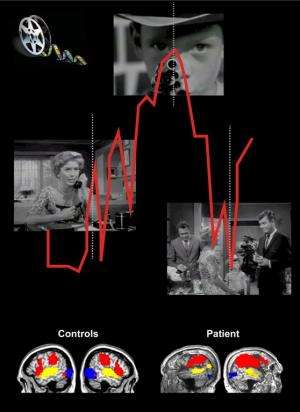Neuroscientists decode conscious experiences with Hitchcock film

(Medical Xpress)—Western researchers have extended their game-changing brain scanning techniques by showing that a short Alfred Hitchcock movie can be used to detect consciousness in vegetative state patients. The study included a Canadian participant who had been entirely unresponsive for 16 years, but is now known to be aware and able to follow the plot of movies.
Lorina Naci, a postdoctoral fellow from Western's Brain and Mind Institute, and her Western colleagues, Rhodri Cusack, Mimma Anello and Adrian Owen, reported their findings today in The Proceedings of the National Academy of Sciences (PNAS), in a study titled, A common neural code for similar conscious experiences in different individuals.
While inside the 3T Magnetic Resonance Imaging (MRI) Scanner at Western's Centre for Functional and Metabolic Mapping, participants watched a highly engaging short film by Alfred Hitchcock. Movie viewing elicited a common pattern of synchronized brain activity. The long-time unresponsive participant's brain response during the same movie strongly resembled that of the healthy participants, suggesting not only that he was consciously aware, but also that he understood the movie.
"For the first time, we show that a patient with unknown levels of consciousness can monitor and analyze information from their environment, in the same way as healthy individuals," said Naci, lead researcher on the new study. "We already know that up to one in five of these patients are misdiagnosed as being unconscious and this new technique may reveal that that number is even higher."
Owen, the Canada Excellence Research Chair in Cognitive Neuroscience and Imaging, explained, "This approach can detect not only whether a patient is conscious, but also what that patient might be thinking. Thus, it has important practical and ethical implications for the patient's standard of care and quality of life."
The researchers hope that this novel method will enable better understanding of behaviorally unresponsive patients, who may be misdiagnosed as lacking consciousness.
More information: "A common neural code for similar conscious experiences in different individuals." Published online before print September 15, 2014, DOI: 10.1073/pnas.1407007111. PNAS September 15, 2014
















